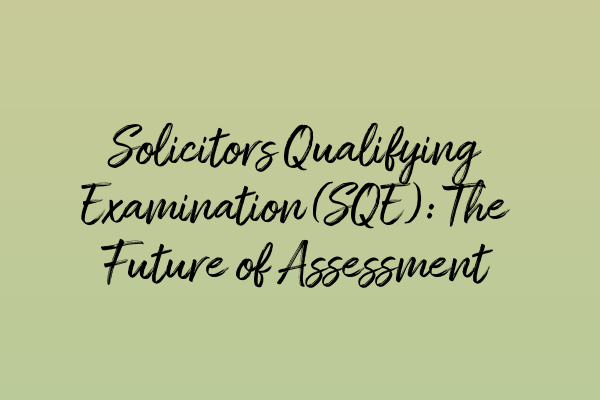Solicitors Qualifying Examination (SQE): The Future of Assessment
In the ever-evolving legal landscape, it is essential for solicitors to possess the knowledge and skills necessary to provide effective and competent legal representation to their clients. To meet this demand, the Solicitors Regulation Authority (SRA) has introduced the Solicitors Qualifying Examination (SQE), which is set to revolutionize the way aspiring solicitors are assessed and qualified. In this article, we will explore the SQE and its implications for the future of legal assessment.
The SQE aims to create a standardized and consistent assessment process for all aspiring solicitors, regardless of their educational background or training route. It replaces the traditional route to qualification, which involved completing the Legal Practice Course (LPC) followed by a period of training contract. Instead, it provides a more flexible path to qualification, allowing candidates to demonstrate their competence through a series of assessments at different stages of their legal career.
One of the key benefits of the SQE is its focus on assessing practical legal skills, rather than just theoretical knowledge. This shift acknowledges the importance of practical skills in the legal profession and ensures that candidates are equipped with the necessary tools to succeed in their future legal practice. The SQE assesses skills such as legal research, client interviewing and advising, drafting, and advocacy, which are essential for effective legal representation.
Moreover, the modular structure of the SQE allows candidates to complete the assessments at their own pace, providing greater flexibility and accessibility. This is particularly beneficial for those who may have financial constraints or other commitments, as it enables them to work towards qualification while managing their personal and professional responsibilities.
Additionally, the SQE promotes diversity and inclusivity within the legal profession. By removing the requirement for a specific educational qualification, it allows candidates from various backgrounds to enter the legal profession, thereby enhancing representation and fostering a more diverse workforce. This inclusivity is essential for promoting equal opportunities and ensuring that the legal profession reflects the society it serves.
However, as with any significant change, there are concerns surrounding the implementation and impact of the SQE. Some argue that the modular structure may result in a fragmented learning experience, as candidates focus on specific assessments without fully understanding the broader context of the law. Others raise concerns about the potential lack of oversight during the assessment process and the possibility of compromising the quality and integrity of legal education.
To address these concerns, it is crucial for regulatory bodies, legal professionals, and training providers to work collaboratively to ensure that the SRA maintains rigorous standards throughout the assessment process. This can be achieved through the development of comprehensive training programs, ongoing monitoring and evaluation, and the provision of supportive resources for candidates.
As the legal profession continues to evolve, it is essential for assessment methods to adapt and align with the changing needs of the industry. The introduction of the SQE signifies a significant step in this direction, providing a robust and flexible framework for assessing the competence of future solicitors. By focusing on practical skills and promoting inclusivity, the SQE aims to produce well-rounded and competent legal professionals who are equipped to meet the demands of a rapidly changing legal landscape.
In conclusion, the Solicitors Qualifying Examination (SQE) represents the future of legal assessment, with its focus on practical skills, flexibility, and inclusivity. While there are concerns surrounding its implementation, collaborative efforts from regulatory bodies, legal professionals, and training providers can ensure that the SQE maintains the highest standards and enhances the quality of legal education. The SQE is set to propel the legal profession into a new era of competence and diversity, ultimately benefiting both aspiring solicitors and the clients they serve.
If you’re interested in learning more about related topics, please visit the following articles:
– [Private Prosecutions: Exploring Non-Governmental Prosecutions in Criminal Cases](https://criminal-practice-law-sqe.co.uk/private-prosecutions-exploring-non-governmental-prosecutions-in-criminal-cases/)
– [Rights of the Accused: Protecting Individual Liberties in Criminal Proceedings](https://criminal-practice-law-sqe.co.uk/rights-of-the-accused-protecting-individual-liberties-in-criminal-proceedings/)
– [Magistrates’ Court vs Crown Court: Understanding Key Differences](https://criminal-practice-law-sqe.co.uk/magistrates-court-vs-crown-court-understanding-key-differences/)
– [Protecting Vulnerable Witnesses in Criminal Trials: Best Practices and Legal Safeguards](https://criminal-practice-law-sqe.co.uk/protecting-vulnerable-witnesses-in-criminal-trials-best-practices-and-legal-safeguards/)
– [Unraveling the Complexities of UK Bail Laws](https://criminal-practice-law-sqe.co.uk/unraveling-the-complexities-of-uk-bail-laws/)
Remember, the SQE is not just a new assessment method; it represents a transformative shift in how we qualify solicitors, ensuring that the legal profession remains relevant and adaptive in the face of changing times.


Leave a Reply